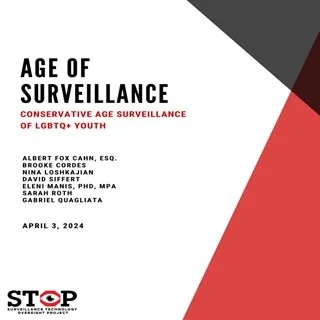By Albert Fox Cahn, Esq., Brooke Cordes, Nina Loshkajian, David Siffert, Eleni Manis, PHD, MPA, Sarah Roth, and Gabriel Quagliata
We’re at an inflection point in the design of American internet as a new wave of laws seeks to dramatically expand government surveillance of everything from social media to libraries, all in the name of protecting children. But while few objectives are as laudable as keeping kids safe, the rhetoric of child protection frequently masks a far darker reality: an effort to use immense new surveillance powers to attack LGBTQ+ youth and the institutions that serve them. In recent years, far-right lawmakers have used this child protection narrative to pass a patchwork of new measures at the state level that are already radically remaking what content is available in their jurisdictions. But perhaps the most alarming discovery is how growing numbers of liberal lawmakers are now following suit, joining in to expand surveillance and control of internet platforms in ways that undermine anonymity and endanger the open internet. Of course, these newest progressive proponents of internet tracking don’t share their conservative counterparts’ anti-LGBTQ+ ideology. Instead, they’ve come to view expanded government surveillance of internet platforms as a corrective to platforms’ unethical misuse of children’s data and use of dangerous features. Unfortunately, while many of the measures making their way through statehouses are poorly positioned to address the real drivers of social media harms, they will unintentionally strengthen this far-right attack on the LGBTQ+ internet resources.



